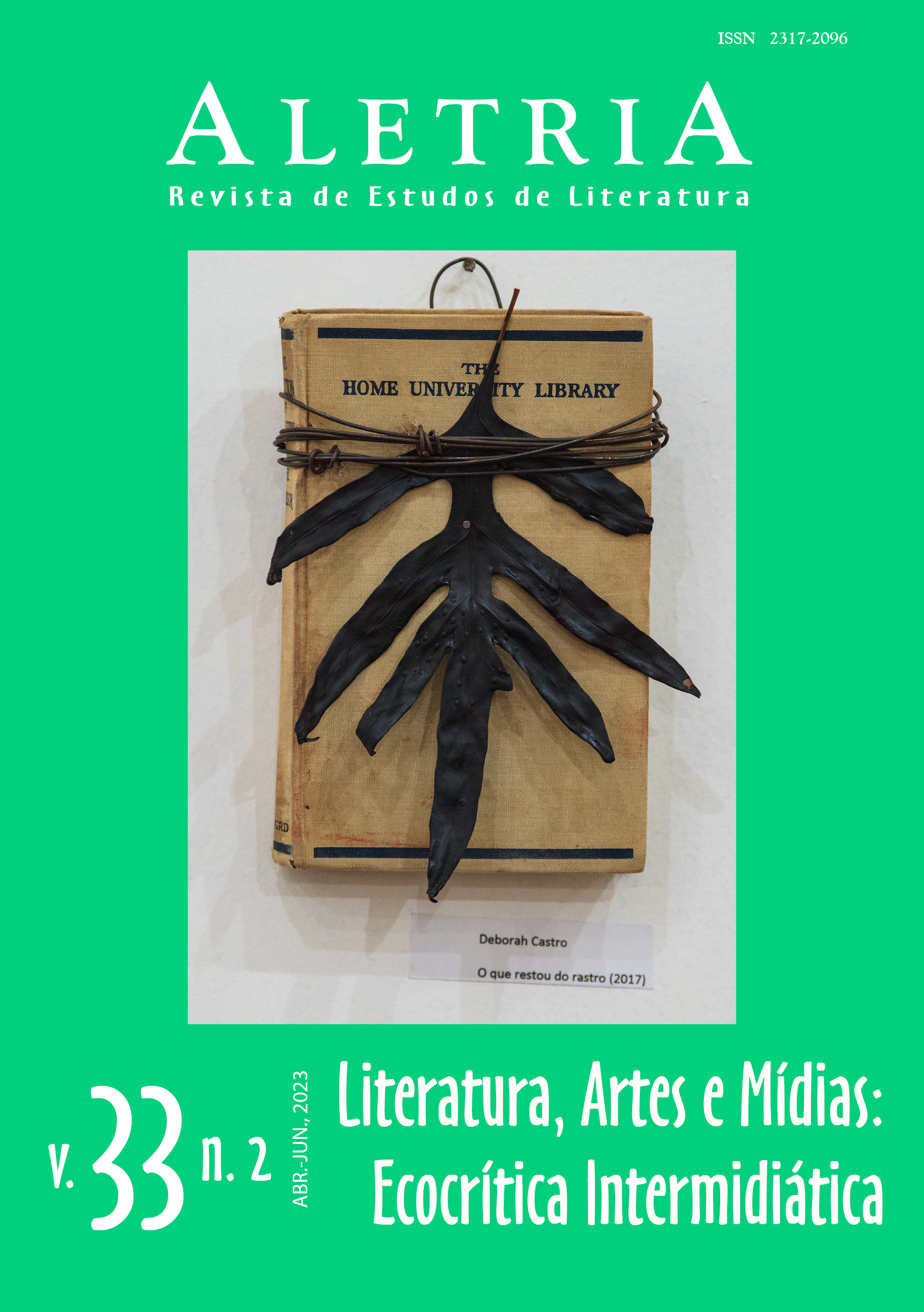Once Upon a Time in Venezuela (2020) The atlas of ruin.
Keywords:
ecocritica, cine venezolano, migración, política, Antropoceno, AtlasAbstract
The environmental problem has a close link with political activity. The documentary Once upon a time in Venezuela (2020) by Anabel Rodríguez exhibits this relationship, making the visual story coincide, the political migration crisis in Venezuela and the environmental crisis of a palafitte town that will disappear due to sedimentation. In this article I explain how the conception of the Anthropocene proposed by Maldonado (2016), contrasts with the perspective that Cornil (2017) has of the history of Venezuela and with the Andean "new constitutionalism" that incorporates nature as a legal figure. Didi-Huberman's (2011) notion of an atlas, as visual knowledge, serves to organize the analysis of the anachronistic images of the documentary. The reflections around the images, which make up this atlas proposed by Anabel Rodríguez, lead us to ask ourselves about our critical and creative capacities to “postpone the end of the world” as Ailton Krenak (2019) explains
Downloads
References
AGAMBEN, Giorgio. Homo Sacer. Traducción Gimeno Cuspinera. Valencia: Pre-textos. 1998.
ARIAS MALDONADO, Manuel. El giro antropocénico. Sociedad y medio ambiente en la era global. Política y Sociedad. Madrid, v. 53, n. 3, p. 795–814, 30 jun. 2016. DOI: https://doi.org/10.5209/rev_POSO.2016.v53.n3.49508.
ARIAS MALDONADO, Manuel. Antropoceno. La política en la era humana. Barcelona: Tauros, 2018.
BONADIES, Angela. Estructuras de excepción. Homesession.org. Artspace & Artist in residence. Barcelona, España. S/F. Disponible en: http://www.homesession.org/wordpress/es/angela-bonadies. Consultado el: 08/08/2022
CAPRILES, Colette. La excepción y la ruina. Tópico Absoluto. Revista de crítica de pensamiento e de ideas. Berlin/Caracas: 15 jul 2022. Disponible en: https://tropicoabsoluto.com/2022/07/15/la-excepcion-y-la-ruina/. Consultado el: 05/08/2022.
CONGO Mirador: El pueblo del Relámpago el Catatumbo terminó de desaparecer. Nuestra Tele Noticias (NTN24). Venezuela. 2022. (1 video. 9min48s). Disponible en: https://www.youtube.com/watch?v=6WNAsyigBUA. Consultado el: 05/08/2022.
CORNIL, Fernando. El estado Mágico. Naturaleza, dinero y modernidad en Venezuela. Texas: Nueva Sociedad, 2002.
DIDI-HUBERMAN, George. Atlas. ¿cómo llevar el mundo a cuestas? Madrid: Museo nacional centro de Arte Reina Sofia, 2011.
ÉRASE una vez en Venezuela. Dirección de Anabel Rodríguez Ríos. Venezuela SEPP R. BRUDERMANN, 2020. (100min). Disponible en: https://www.youtube.com/watch?v=ob8PTZlNypA&t=2784s. Consultado el: 08/05/2023.
GRAU, Pedro. Pórtico de Venezuela. In: PACHECO, Carlos; LINARES, Luis; STEPHAN, Beatriz (coord.) Nación y literatura: itinerarios de la palabra escrita en la cultura venezolana. Caracas: Editorial Bigott/Banesco/Equinoccio, 2006, p. 7-33.
KRENAK, Ailton. Ideias para adiar o fim do mundo. São Paulo: Companhia das Letras, 2019.
LEFEBVRE, Henri. La producción del espacio. Traductor Emilio Martínez Sérgio. Madrid: Capitán Swing Martins, 2013.
LERNER, Elisa. El Miss Venezuela otra versión fracasada de El Dorado. In: Crónicas Ginecológicas. Caracas: Línea editores, 1984, p. 29-37.
MONTERO, Darío. Congo-Mirador. Pueblo palafítico del Lago de Maracaibo. Mérida, Venezuela: EuroAmerica, 1971.
NÚÑEZ, Enrique Bernardo. Novelas y ensayos. Caracas: Biblioteca Ayacucho, 1987.
PIETRI, Arturo. Sembrar el Petróleo. Revista de Artes y Humanidades Caracas: UNICA, vol. 6, núm. 12, enero-abril, 2005, pp. 231-233 consultado el 05/08/2022. Disponible en: https://www.redalyc.org/pdf/1701/170121560013.pdf.
SANTOS, Boaventura de Sousa. Para além do pensamento abissal: das linhas globais a uma ecologia de saberes. In: SANTOS, Boaventura de Sousa; MENESES, Maria Paula. Epistemologias do Sul. São Paulo: Cortez, 2010, p. 31-66.
SANTOS, Elisangela. O Novo Constitucionalismo Latino Americano: A pachamama e sua relação com o desenvolvimento econômico capitalista. Revista de Pesquisa e Educação Jurídica. Brasília, v.2 n.1 p.157-175 enero-jun. 2016. Disponible en: http://dx.doi.org/10.26668/IndexLawJournals/2525-9636/2016.v2i1.186. Consultado el: 16/08/2022
TORRES. Ana. Diario en ruinas (1998-2017). Caracas: Alfa, 2018.
Downloads
Published
How to Cite
Issue
Section
License
Copyright (c) 2022 JESÚS ARELLANO (Autor)

This work is licensed under a Creative Commons Attribution 4.0 International License.
Authors who publish with this journal agree to the following terms:Authors retain copyright and grant the journal right of first publication with the work simultaneously licensed under a Creative Commons Attribution Non-Commercial No Derivatives License that allows others to share the work with an acknowledgement of the work's authorship and initial publication in this journal.Authors are able to enter into separate, additional contractual arrangements for the non-exclusive distribution of the journal's published version of the work (e.g., post it to an institutional repository or publish it in a book), with an acknowledgement of its initial publication in this journal.Authors are permitted and encouraged to post their work online (e.g., in institutional repositories or on their website) prior to and during the submission process, as it can lead to productive exchanges, as well as earlier and greater citation of published work (See The Effect of Open Access).





